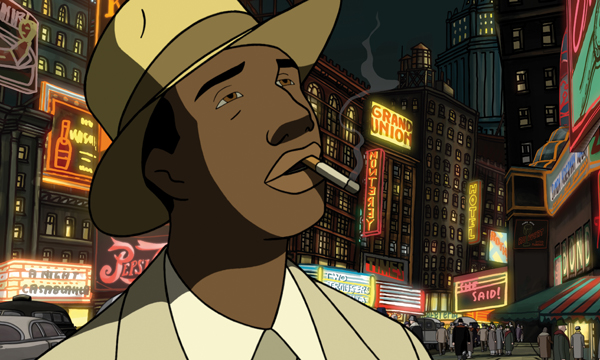
Chico (voiced by Emar Xor Oña (GKIDS/Luma Films)
![]() Chico & Rita is an animated delight for the eye and ear, besides being a sexy romance and a luscious tribute to a great musician.
Chico & Rita is an animated delight for the eye and ear, besides being a sexy romance and a luscious tribute to a great musician.
Spanish director Fernando Trueba first documented his passion for Latin jazz in Calle 54 (2000), offering brief biographical introductions to a dozen masters and rising stars in exquisite, sophisticated performances. Much as Wim Wenders’ Buena Vista Social Club the year before reintroduced the world to an older generation of Cuban musicians, Trueba’s “new” discovery for jazz audiences was Cuban pianist Bebo Valdés, who had been living in quiet European exile after the revolution. Valdés continued to work with Trueba, and Chico & Rita is their creative collaboration that draws on the nonagenarian’s life and music to weave a fictional story of the intertwined careers, travels, and loves of a pianist and a singer.
Elderly Chico shines shoes in contemporary Havana in the opening sequence, but a nostalgic radio program sends him back to his thoughts of 1948, when he was sure he could win a contest for a regular hotel gig—if only he could find the right girl singer to front his band. Not that he’s having trouble getting women. Havana is colorfully portrayed as a hot spot for American gamblers, sailors, and tourists, especially those seeking some interracial spice. He immediately falls for Rita’s singing (performed by Idania Valdés, no relation to Bebo) as much as for her earthy sexiness. (It’s great to see an animated female who doesn’t look like a Disney princess or mother.) Pursuing her from famous nightclubs to underground dance halls, he gets her into his bed (warning—full frontal cartoon nudity), and into his music (played by Bebo), naming a love song for her. But their romance and ambitions keep getting entangled with jealous ex-girlfriends and white promoters.
Rita gets tempted to perform in New York, giving Chico nightmares about the Big Apple, including fears that she will be reduced to a Carmen Miranda stereotype. When he follows her, the whole look and sound of the film changes to the cold, hard, monochromatic reality of immigrant life. (Chico’s friend and manager, Ram?n, can only find work as a doorman at the Plaza.) But she finds success as Rita LaBelle, based on her exotic sex appeal and singing talent, much like how Lena Horne was presented in the movies, and Chico finds creative satisfaction in the burgeoning bebop scene, alongside the first Cuban percussionists in jazz bands. The animated cameos of jazz greats, some brought to life on the soundtrack by noted jazzmen, are great fun—Charlie Parker (saxophone played by Germán Velazco); Tito Puente (played by Amadito Valdés, no relation, of Buena Vista Social Club); Nat King Cole (sung by his brother Freddy Cole); and Ben Webster (saxophone played by octogenarian Jimmy Heath). One of the beauties of Bebo’s score is its fealty to authentic jazz, without resorting to a fusion with salsa or commercial dance pop to appeal to a broad audience.
Though Chico travels with the likes of Woody Herman and Dizzie Gillespie to Europe and onto other women, he can’t forget Rita, and a fleeting reunion ends up getting him deported back to Cuba, just in time for the revolution. (The informative Unfinished Spaces, directed by Alysa Nahmias and Benjamin Murray, now making the festival rounds, documents the creative fervor among Cuban artists at this time and the disastrous impact on their work and lives when modernism was declared counter-revolutionary.)
Spanish flamenco singer Estrella Morente rescues Chico’s career late in life for a success that would seem too Hollywood if it didn’t parallel Bebo’s own rejuvenation, let alone a Vegas reunion with Rita. Even as musicians protest the elimination of Latin jazz as a distinct Grammy category from the National Academy of Recording Arts and Sciences, the American Academy of Motion Picture Arts and Sciences has nominated Chico & Rita for Best Animated Feature in support of beautiful hand-drawn animation for grown-ups.






This is an excellent movie – I highly recommend.